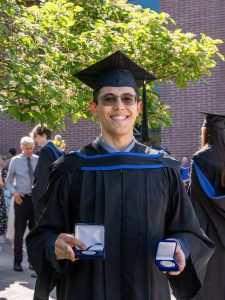Meet Olivia Martiskainen, co-winner of the 2025 Walley Lightbody Award in Law:
Name: Olivia Martiskainen
Program: Economics
Graduated: June 2025
What drew you to this program, and how did it shape your academic path?
I was drawn to the department for its interdisciplinary approach, which allowed me to explore the connections between economics, political science, and philosophy. This breadth helped shape my critical thinking and sharpened my interest in systemic issues like inequality and public policy. The program gave me the academic foundation and confidence to pursue law.
Were there any standout courses or faculty members who influenced your journey?
Courses in public economics, law and economics, and healthcare economics stood out to me for their real-world relevance and complexity. Professors who encouraged open discussion and critical inquiry had a lasting impact on my academic development. Their mentorship and feedback pushed me to remain open-minded and communicate my opinions more effectively.
What made you decide to pursue a career in law?
Through my academic work and community engagement, I developed a strong interest in how laws shape economic and social outcomes. I want to work in areas like labour or public interest law to help build more equitable systems. Law offers the tools to advocate for meaningful change and uphold justice.
How did your involvement in the department or on campus help you prepare for law school?
Serving as a teaching assistant and volunteering in community health and cultural organizations helped me develop strong communication and leadership skills. I was also involved in multiple student clubs and sports, which helped me make new friends and connections and improve my networking skills. These hands-on experiences complemented my academic studies and prepared me for the demands of law school.
What was the application process like for the Walley Lightbody Award in Law?
I appreciated that the application process was relatively straightforward. The application encouraged me to reflect on how my studies, values, and future goals aligned with the purpose of the award, and I liked that there was some flexibility introduced by being able to write a letter of intent rather than answer a set of questions.
How did it feel to receive the award?
I am honoured and grateful to be selected from what I have heard was a very competitive and well-qualified group of applicants. It felt rewarding to have my academic and professional goals recognized in this way.
How has the award helped you as you prepare for your next chapter?
The award has eased financial stress, allowing me to focus more on preparing for law school entrance and related opportunities. It also serves as a powerful reminder of the support available for students pursuing socially meaningful careers. The recognition has motivated me to continue striving for excellence in my future studies.
What are your future plans?
I will begin law school in the fall at McGill University in Montreal. I am excited to learn more about the different fields of law and see what fits my interests and capabilities. Currently, I am feeling more drawn toward public interest or public policy focused legal fields, but this may change.
What advice would you give future students?
Take advantage of every opportunity to connect what you learn in the classroom to real-world issues. Always say yes to the chance to learn something new. Don’t be afraid to pursue a non-linear or non-traditional path, experiences outside of academics or outside of your field of study can be just as formative and give you many transferable skills.
Is there anything you’d like to say to the program/department or the donor?
I’m deeply thankful to the department for its encouragement and to Mr. Walley Lightbody for his generosity in supporting future legal professionals. This award has made a difference for me and affirmed my commitment to the study of law. Your support inspires me to keep pushing forward.

 I was attracted to the PPE program by the prospect of challenging myself to study these three deeply interrelated fields in preparation for further legal studies. The fact that this unique opportunity was available to me so close to home and in a tightly-knit, community-oriented university was a true stroke of good fortune. I am more passionate than ever about attending law school and working in the legal profession in the future.
I was attracted to the PPE program by the prospect of challenging myself to study these three deeply interrelated fields in preparation for further legal studies. The fact that this unique opportunity was available to me so close to home and in a tightly-knit, community-oriented university was a true stroke of good fortune. I am more passionate than ever about attending law school and working in the legal profession in the future.





